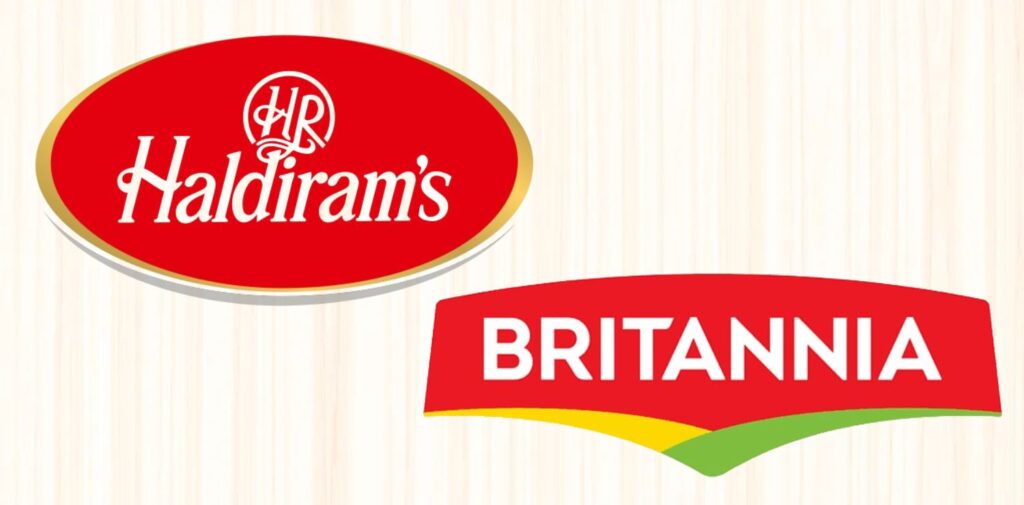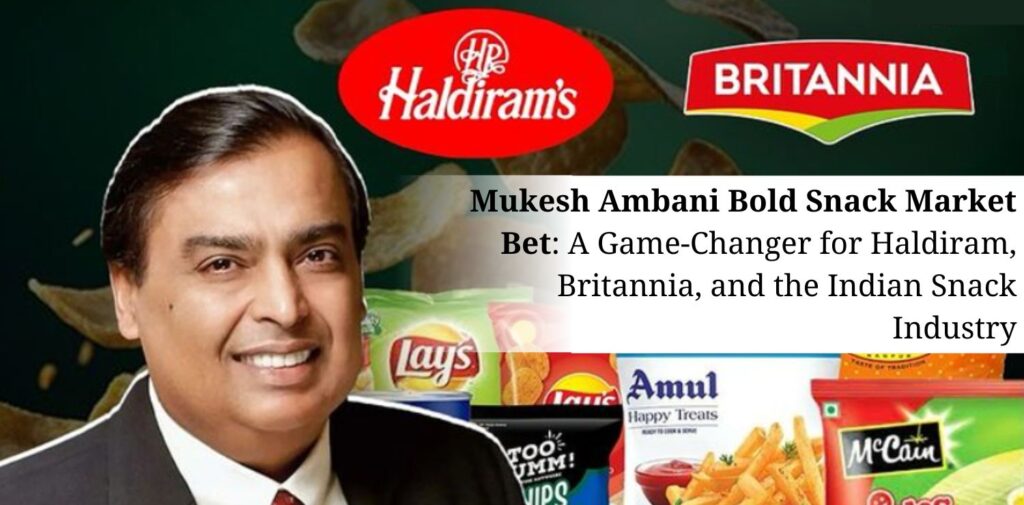Mukesh Ambani, the chairman and largest shareholder of Reliance Industries, has once again signalled his aggressive entry into a booming sector of the Indian economy, this time focusing on the lucrative snack market. With his unparalleled business acumen and a vast network of resources, Ambani’s foray into this multi-billion-dollar industry is poised to shake up the existing competitive landscape. The big players—Haldiram’s and Britannia—who have long dominated the Indian snack market, may soon face stiff competition from this new entrant. Reliance’s entry into the sector could mark the beginning of a new era in the Indian snack industry, challenging traditional powerhouses and redefining consumer behaviour.
Reliance’s Snack Market Foray: What’s the Big Deal?
Reliance Industries, traditionally known for its oil, gas, and petrochemical businesses, is no stranger to diversification. In recent years, the company has ventured into retail, e-commerce, telecommunications, and even the fashion sector through its various subsidiaries. Ambani’s latest venture—into the food and snack industry—could prove to be one of his most significant moves yet. With an estimated market size of over ₹42,000 crore (around $5.7 billion), the Indian snack industry is experiencing rapid growth. The demand for packaged snacks has skyrocketed, driven by factors like urbanization, changing lifestyles, and a growing preference for convenience foods.
Reliance, with its vast distribution network, robust retail presence (via Reliance Fresh and Reliance Digital), and formidable brand strength, is poised to capitalize on this demand. The company is expected to leverage its deep pockets and technological expertise to disrupt the traditional snack sector, offering a wide variety of products ranging from traditional Indian snacks to international favourites, all while ensuring affordability and availability.

The Snack Market Giants: Haldiram’s and Britannia
Haldiram and Britannia have long been the undisputed leaders in India’s snack market. Haldiram’s, a brand that originated in the 1930s, has become a household name synonymous with traditional Indian snacks like bhujia, sev, and sweets. With an extensive range of products, a strong brand presence, and a loyal customer base, Haldiram’s has dominated the organized snacks market for decades. It has successfully expanded its reach beyond India, exporting its products worldwide.
Britannia, on the other hand, is one of the oldest and most trusted brands in the Indian food industry. Known for its biscuits, cakes, and dairy products, Britannia’s snacks division—especially its packaged products like chips and crackers—has a significant share of the Indian market. Over the years, Britannia has diversified its snack offerings to cater to both traditional and modern palates, helping it maintain a strong presence in a highly competitive market.
However, despite their market dominance, both Haldiram’s and Britannia face growing challenges. Consumer tastes are evolving, with an increasing preference for health-conscious options, premium products, and international flavours. The rise of e-commerce has also led to a more fragmented market, where new, nimble players can introduce innovative products and reach consumers more directly. As a result, established players like Haldiram and Britannia must constantly innovate to stay relevant in the fast-changing snack landscape.

Mukesh Ambani’s Strategy: Innovation, Scale, and Affordability
Mukesh Ambani’s entry into the snack market comes at a time when consumers are more discerning than ever before. The demand for healthier snack options, as well as a growing appetite for premium and international flavours, has reshaped the snack industry in India. While Haldiram’s and Britannia have adapted to some of these trends, their offerings are still largely focused on the traditional snack categories—something that could give Reliance an edge.
Reliance is expected to focus on a few key strategies that will help it take on the established snack giants:
- Leveraging Technology and Scale: Reliance has always been known for its massive scale, and it will undoubtedly use this to its advantage in the snack sector. By employing technology to streamline its supply chain and manufacturing processes, Reliance can keep costs low and maintain a competitive edge in terms of pricing. Moreover, its vast retail and distribution network—spanning both offline stores like Reliance Fresh and digital platforms such as JioMart—provides it with a ready-made channel to reach consumers across India, from tier-1 cities to rural areas.
- Expanding Product Portfolio: One of the primary ways Reliance can disrupt the market is by offering a broad and diverse range of products. Reliance is expected to offer both traditional Indian snacks (like those that have made Haldiram’s successful) and international snack options, catering to changing consumer tastes. By introducing innovative flavours and healthier alternatives, Reliance can appeal to a new generation of consumers who are more health-conscious and open to experimenting with new products.
- Aggressive Marketing and Brand Positioning: Ambani’s Reliance brand is synonymous with trust, quality, and affordability. The company’s marketing strategies will likely emphasize these qualities while positioning its snack offerings as both premium and accessible. With the backing of one of the most powerful business empires in India, Reliance has the resources to mount a large-scale marketing campaign across multiple media platforms. This would allow them to quickly build brand recognition and loyalty among Indian consumers.
- Healthier Options: With increasing awareness around health and wellness, there is a growing demand for healthier snack alternatives, such as baked snacks, gluten-free options, and products low in sugar or preservatives. Reliance is expected to cater to this market segment by introducing a range of healthier, premium snack products, in line with global trends.
- Aggressive Pricing Strategy: Ambani’s reputation for disrupting markets with aggressive pricing strategies is well-known. In a price-sensitive market like India, offering value for money while maintaining high quality will likely be a core aspect of Reliance’s snack strategy. This could put pressure on Haldiram and Britannia, who may find it challenging to match the scale and price competitiveness of Reliance’s offerings without compromising their brand image.

The Competitive Impact: What This Means for Haldiram and Britannia
As Reliance enters the snack market, the most immediate question is: How will it impact the existing giants like Haldiram’s and Britannia? The competition will undoubtedly intensify. Both Haldiram’s and Britannia have strong brand loyalty, but Reliance’s deep pockets, vast distribution network, and technology-driven approach give it a distinct advantage.
- Haldiram’s: While Haldiram’s has a stronghold in the traditional Indian snacks segment, it may struggle to keep up with the innovation and scale that Reliance can offer. Haldiram is also facing challenges from newer players in the market who are offering healthier and more premium alternatives. To counter this, Haldiram may need to accelerate its product diversification and innovation strategies, particularly focusing on premium and health-oriented snacks.
- Britannia: Britannia has already made moves to diversify its snack offerings beyond biscuits, but Reliance’s entry into the market could force the brand to rethink its strategy. Britannia’s significant presence in the biscuit market gives it a solid base, but its snack offerings still lag compared to newer, more innovative players. To compete effectively, Britannia will need to enhance its product portfolio and introduce differentiated, value-driven products that appeal to evolving consumer preferences.
Conclusion: Mukesh Ambani Bold Snack Market Bet – A Game-Changer for the Snack Industry
Mukesh Ambani’s entry into the Indian snack market is more than just a business move—it is a statement of intent to dominate a rapidly growing sector. By leveraging its vast resources, distribution networks, and technological capabilities, Reliance is poised to challenge established snack giants like Haldiram and Britannia. The competition will intensify, and both these brands will need to innovate rapidly to stay ahead. Consumers, on the other hand, stand to benefit from a broader array of choices, more affordable prices, and possibly even healthier options.
Ultimately, Mukesh Ambani’s Reliance could become a formidable force in India’s snack industry, reshaping the landscape and forcing the existing players to adapt to the new era of consumer demand and market dynamics. The next few years will be crucial as these giants battle for dominance in one of the most exciting and competitive sectors of the Indian economy.




